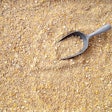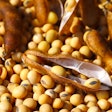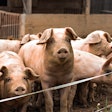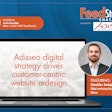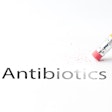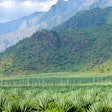Sustainability was a reoccurring theme among VIV Europe exhibitors
at VNU’s “Meet the Press” event, held in Amsterdam in mid-February. Journalists
serving the animal protein supply chain from feed to meat gathered at a series of
venues to meet choice exhibitors during a “speed dating” session, which entailed
two afternoons of rotating, informal discussions.
During these “dates,” it was interesting to leave the confines
of animal nutrition and feed manufacturing to chat with suppliers involved in different
– but equally important – disciplines such as meat processing and on-farm production
solutions. As can be imagined, the definition of sustainability varied from supplier
to supplier – much as the connotation shifts geographically, reliant on the respective
region’s priorities. However, the fundamental message was the same: To be successful
in the years ahead, animal agriculture needs to find a way to sustain itself through
new technologies and added environmental stewardship.
To this point, VIV organizers have rolled out a sustainability
track at the 2014 edition, which will be held in Utrecht, May 20-22. According to
Ruwan Berculo, VIV Europe’s exhibition manager, the event’s goal is to “add to industry
with innovation and knowledge.”
VIV’s sustainability showcase
“There is more need to meet in person than ever at relevant platforms,”
Berculo says, noting that the Netherlands is the best place for the event because
delegations from around the world can see how the country implements “sustainable
intensification” on a small scale.
The conference track is targeted to operations of all sizes and
will feature a number of sessions and off-site tours to aid in demonstrating how
agriculture has – and will be able to – implement these concepts. In addition, VIV
organizers have set up an “Innovation Gallery” to highlight new products supporting
the sustainability cause.
In addition, VIV organizers have commissioned “sustainability
champion” Dr. Louise Fresco, a professor at the University of Amsterdam and former
assistant director general of the United Nations’ Food and Agriculture Organization
(FAO), to present a keynote address on why producers should adopt the sustainable
intensification mindset.
‘Speed date’ sustainability highlights
Here’s a recap of a few reoccurring sustainability themes presented
during the event:
STARTING AT THE SOURCE: In a bid to establish the credibility
of the company’s commitment to developing sustainable nutrition solutions, Nutreco
Holding NV has developed a sustainability assessment system named NutrECO-line,
based on eight impact categories: feed ingredients sourced from responsible managed
production systems; responsible production of nutritional solutions; economic performance;
animal performance; resource depletion; indirect measurements on conservation of
biodiversity; animal health and welfare; and human health and safety.
NutrECO-line was designed, tested and verified by a third party
in 2013. The methodology is used to assess the sustainability of Nutreco’s portfolio
of new nutritional solutions prior to a product’s external launch. In 2014, NutrECO-line
will be used to evaluate the company’s existing and new nutritional solutions.
“Besides innovation and quality, sustainability is a guiding
principle embedded in the Nutreco culture from research and raw material procurement
to products and services,” reports Jose Villalon, Nutreco’s corporate sustainability director. NutrECO-line “guides our research and development efforts.”
BEST PRACTICES: Chantal van Lin, corporate marketing and communications
adviser with De Heus Animal Nutrition, the No. 16 compound feed producer in the
world, cites that knowledge-share across the company’s global network provides the
means to ensure its 30 plants produce the most cost-effective, sustainable feed
possible.
“We strive for uniform, high-quality products everywhere we are
active. But all countries are different on many different levels. For example, the
use of raw materials may differ from location to location as well. These differences
mean there’s a lot to be learned, shared and applied across all of facilities and
that is what we do,” she says, noting that the company also strives to source local
ingredients to limit the environmental footprint.
RECYCLING WASTE: Andre Hermsen, sales manager, Dorset Green Machines,
a manufacturer of biomass drying systems for poultry manure, suggests that the recycling
of biomass is one way to reduce the transportation footprint and fuels cost by lowering
the volume being moved – and the conversion of waste offers producers a salable
product, energy benefits and a sustainable waste solution.
AUTOMATION + SAFETY: On the processing side, David Hazenbroek,
managing director, Foodmate B.V., addressed sustainability from a food safety and
labor standpoint.
“The less hands touching the raw product, the better,” he says,
noting that automated systems stabilize the food by removing variables and lightening
the demand for reliable employees.
Judith Marques dos Ries-Koops, communication manager, Meyn Food
Processing, agrees. “Sustainability encompasses everything from energy consumption,
water usage, animal welfare, worker safety, waste – and the more automated the system,
the better the results.”
Egg-handling equipment supplier Viscon uses automation to improve
hygiene in egg plants. Its new egg inspection system can detect rotten eggs before
vaccination so they cannot contaminate the sterile environment.
ENERGY CONSERVATION: Harold Schroijen, head of sales support,
Van Aarsen International B.V., cites energy savings and compliance with government
regulations as key elements of its sustainability efforts: “Socially responsible
companies want their facilities to be better than mandated.”
About VIV Europe
The 2014 edition of VIV Europe will feature 600 exhibitors and
20,000 relevant participants. VIV is the global brand of trade shows, conferences
and events providing and presenting innovations for multiple species sectors: poultry,
pig, cattle, calves and aquaculture.
For more information on the event, its exhibitors and its sustainability
track, visit http://www.viveurope.nl/en/Bezoeker.aspx.






